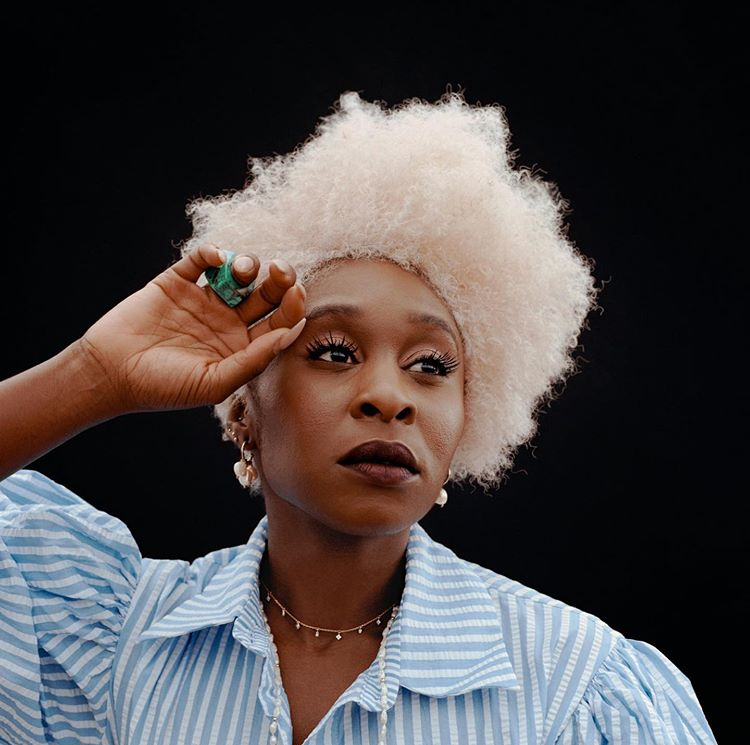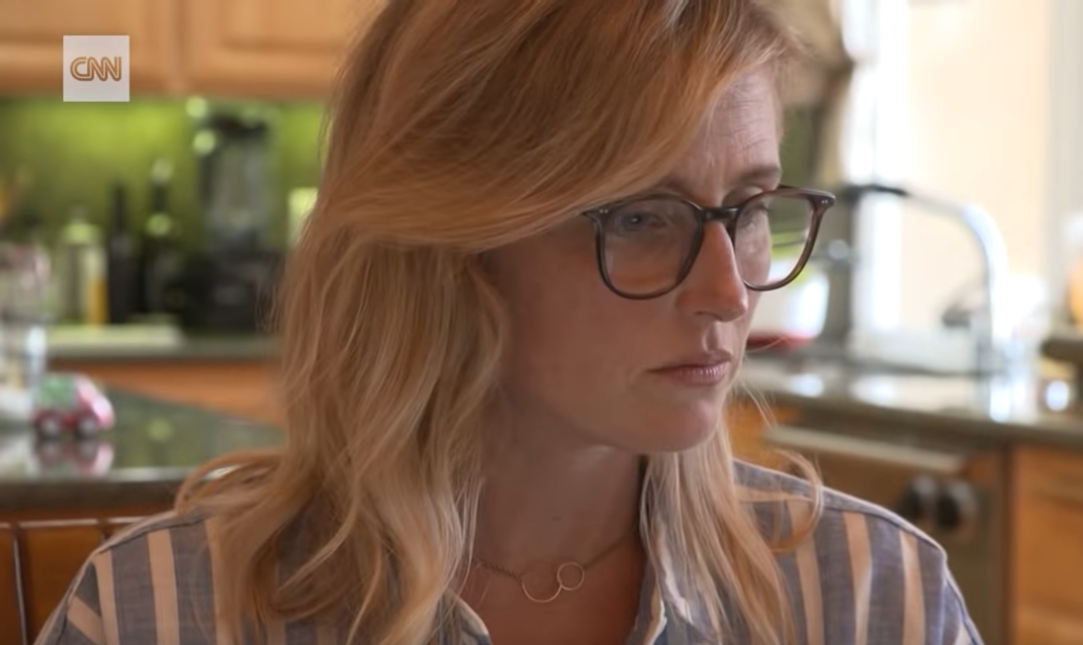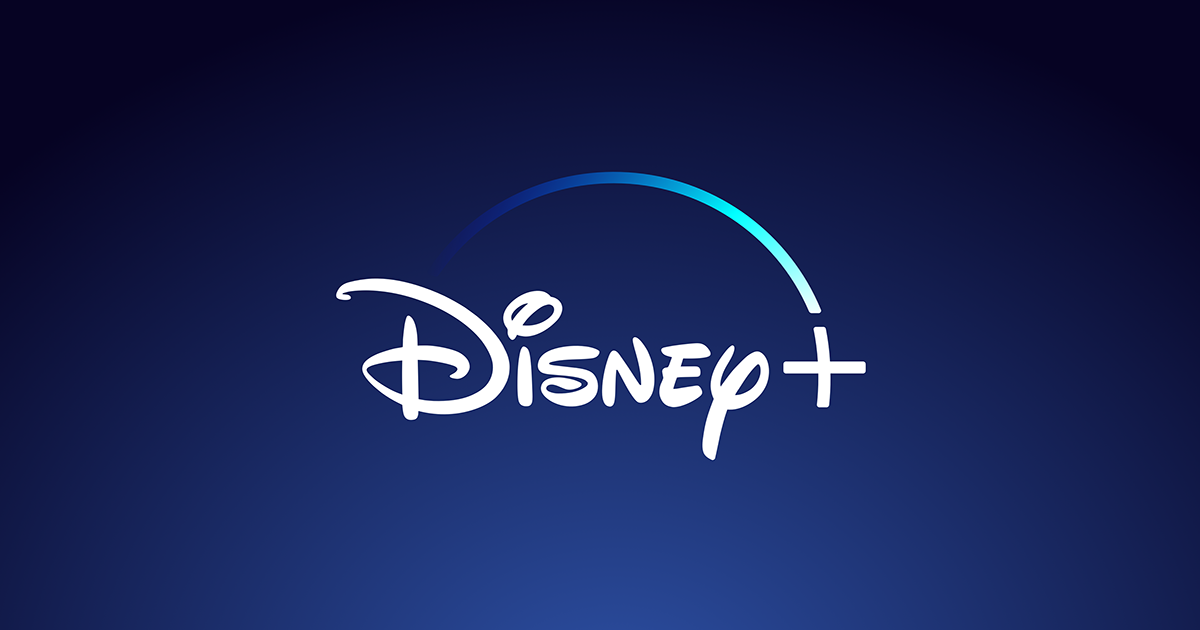British Actress Cynthia Erivo Responds To Past Tweets That Seemingly Mocked Black Americans Chantilly Post
“I’ve never spoken negatively about people because I don’t want that.”
Cynthia Erivo is the British actress who portrays Harriet Tubman in the upcoming biopic on the heroic abolitionist’s life that hits theaters November 1st. The 32-year-old has already received some hate for her role in the film since people questioned why an American actress wasn’t cast to play Harriet and now she’s responded to other hate she received from her past tweets.
In 2013, Cynthia sent out tweets that made it seem as though she was mocking Black Americans adding more fuel to people’s belief that an actress who has no controversy on such a topic should have been cast for the starring role in Harriet.
“As for the tweets, taken out of context without giving me the room to tell you what it meant–and it wasn’t mocking anyone really,” Cynthia told Shadow And Act. “It wasn’t for that purpose at all. It was to celebrate a song I had wrote when I was 16.”
“I would never…I’ve never spoken negatively about people because I don’t want that, I don’t want that energy from me to others,” she added. “I don’t believe that serves us at all, I don’t believe it serves a purpose other than bringing negativity into my life and your life and I just don’t want that.”
Article via HotNewHipHop
Researchers Find Racial Bias in Hospital Algorithm
Healthier white patients were ranked the same as sicker black patients, according to study published in the journal Science
Black patients were less likely than white patients to get extra medical help, despite being sicker, when an algorithm used by a large hospital chose who got the additional attention, according to a new study underscoring the risks as technology gains a foothold in medicine.
Hospitals use the algorithm—from Optum, UnitedHealth Group Inc. ’s health-services arm—to find patients with diabetes, heart disease and other chronic ailments who could benefit from having health-care workers monitor their overall health, manage their prescriptions and juggle doctor visits, according to the study published Thursday in the journal Science.
Yet the algorithm gave healthier white patients the same ranking as black patients who had one more chronic illness as well as poorer laboratory results and vital signs.
The reason? The algorithm used cost to rank patients, and researchers found health-care spending for black patients was less than for white patients with similar medical conditions.
“What the algorithm is doing is letting healthier white patients cut in line ahead of sicker black patients,” said Dr. Ziad Obermeyer, the study’s lead author and an acting associate professor of health policy at the University of California, Berkeley.
Optum advises its customers that its predictive algorithms shouldn’t replace physician judgment, a company spokesman said. Efforts to use analytics in health care have only scratched the surface of their potential and should be continually reviewed and refined, he said.
Optum’s algorithm is used by more than 50 organizations, according the company’s website. Partners Healthcare in Boston is among those to have used it, according to published research. A Partners spokesman said the hospital system is vigilant about how well its algorithms perform. He added a Partners researcher co-authored the paper, which “is an important step in rooting out some of the flaws that exist.”
The Washington Post and Science News earlier reported Optum is the algorithm’s developer.
Algorithms, developed by computers crunching vast data sets, are increasingly shaping choices in medicine, from interpreting medical scans to predicting who might become addicted to opioids, suffer a dangerous fall or end up in the hospital.
The technology can speed up and improve some decisions, leading to better treatment for patients, supporters say. But doctors who get suggestions to tweak their patients’ care based on the findings of algorithms often don’t know the details of the technology that led to the recommendation.
Poorly designed algorithms risk reinforcing racial and gender biases, technology experts caution, as studies of algorithms in nonmedical settings like credit scoring, hiring and policing have found.
Algorithms “can give the gloss of being very data-driven, when in fact there are a lot of subjective decisions that go into setting up the problem in the first place,” said Solon Barocas, an assistant professor at Cornell University who is also a principal researcher at Microsoft Research.
Researchers behind the study said well-designed algorithms could help reduce bias that leads to wide disparities in health-care outcomes and access to care. They created an alternative algorithm that increased the percentage of those identified for extra help who were black to about 47%, up from 18%.
“It’s a tool that can do a great deal of good and a great deal of bad, it merely depends on how we use the tool,” said Sendhil Mullainathan, a University of Chicago computational science professor who was an author of the study.
Hospitals and health insurers across the U.S. use the Optum algorithm to spot patients who could benefit from extra help from nurses, pharmacists and case workers, the authors of the study said.
To identify those with the biggest medical needs, the algorithm looks at patients’ medical histories and how much was spent treating them, and then predicts who is likely to have the highest costs in the future.
For the study, data-science researchers looked at the assessments made by one hospital’s use of the algorithm. The study didn’t name the hospital. The researchers focused on the algorithm’s rankings of 6,079 patients who identified themselves as black in the hospital’s records, and 43,539 who identified as white and didn’t identify themselves as any other race or ethnicity.
Then the researchers assessed the health needs of the same set of patients using their medical records, laboratory results and vital signs, and developed a different algorithm.
Using that data, the researchers found that black patients were sicker than white patients who had a similar predicted cost. Among those rated the highest priority by the hospital’s algorithm, black patients had 4.8 chronic diseases compared with 3.8 of the conditions among white patients.
The researchers found the number of black patients eligible for fast-track enrollment in the program more than doubled by prioritizing patients based on their number of chronic conditions, rather than ranking them based on cost.
The findings show “how a seemingly benign choice of label (that is, health cost) initiates a process with potentially life-threatening results,” Ruha Benjamin, author of “Race After Technology” and an associate African-American studies professor at Princeton University, said in an accompanying commentary in Science.
Algorithms are playing an increasing role in medicine, though largely invisible to patients.
Doctors are using algorithms to read scans for lung cancer, for instance. Hospitals are deploying the technology to spot which critically ill patients are likely to worsen dramatically. Meantime, health insurers are using algorithms for reasons including to detect patients who are at risk of opioid addiction or who appear headed toward costly lower-back surgery.
Alan Muney, a former executive at health insurer Cigna Corp., said it is common for insurers to use the projected cost of care as a focus in selecting who might get extra outreach or support.
“It’s troubling there was such a big difference” in the effects for black and white patients based on an algorithm focused on cost, he said.
Insurers are developing algorithms that include variables beyond medical costs, including issues that might signal barriers to accessing care, such as financial stress and food insecurity, he said.
Article via Wall Street Journal
“Harriet” Star Cynthia Erivo Responds to Backlash Over Her Casting | Oprah At Home
Many felt Erivo was not an appropriate actress for this film due to her being Nigerian and what is considered lackluster acting skills. What do you think? Did Erivo do Harriet Tubman justice in this film?
There are more wealthy Chinese than Americans for the first time
London (CNN Business)For the first time, there are more rich Chinese than Americans in the top 10%. A new report from Credit Suisse (CS) shows that wealth in China is ticking up, and the country now accounts for 100 million of the richest 10% of people in the world.
There are 99 million Americans in the same category.The United States still has many more millionaires — 18.6 million, or 40% of the world’s total, versus 4.4 million in China. It’s also adding to the millionaire count at a faster clip. The report credits low interest rates and Republican tax cuts for the country’s 11th consecutive year of rising wealth.
The average American is also still much richer than their Chinese counterparts, with US wealth per adult at $432,365 compared with$58,544 in China.
But China holds claim to a growing piece of the pie, replacing Europe as the principal engine of global wealth growth. That’s in spite of the trade war that’s weighing on the nation’s economy.
“Trade conditions and debt levels are causing concern, but signs for the coming years are otherwise fairly positive,” Credit Suisse observed in its annual Global Wealth Report.
The report highlights the extent to which global wealth is concentrated at the verytop.The bottom 50% of adults account for less than 1% of total wealth, while the top 10% own 82%. The top 1% alone owns almost half of all global assets, according to Credit Suisse.
Has the 1% peaked?
The threshold to make it into the top 10%, globally, is roughly $109,400 in net assets. To be in the top 1%, you’d need just above $936,400.
Still, the picture of wealth inequality since the 2008 financial crisis is complicated. While artificially low interest rates and bond-buying programs from central banks led to a boom in asset prices, raising the share of the top 1% of wealth holders, inequality “continued to decline for those below” that segment, Credit Suisse notes. The share held by the bottom 90% now accounts for 18% of global wealth, up from 11% in 2000. Since 2016, the share held by the top 1% has broadly eased back, per the bank.
“While it is too early to say that wealth inequality is now in a downward phase, the prevailing evidence suggests that 2016 may have been the peak for the foreseeable future,” the report’s authors write.
Article via CNN
This ridiculous 3-hour trailer shows off every TV show and movie coming to Disney+
If there’s any streaming service that can legitimately compete with the juggernaut that is Netflix, it’s Disney+. Set to launch in just a few weeks, Disney+ will not only be extremely affordable at $7 a month, it will offer subscribers an absolute avalanche of media content. From beloved animation films of old to any Star Wars title you can think of, Disney+ will undoubtedly come out of the gate strong and will likely garner an impressive subscriber base in a relatively short period of time.
Earlier this week, the official Disney+ Twitter account started tweeting out a list of all the movies and TV shows set to arrive on the streaming service in early November. And seeing as how Disney has been making movies since 1937, some of the titles Disney highlighted were so incredibly bizarre that it left many people wondering if Disney was trying to troll us. You’d be forgiven, after all, for thinking that titles like The Computer Wore Tennis Shoes and The Barefoot Executive were completely made up.
Not to fear, all of the titles Disney tweeted out over the past few days are very much real.
If anything, some of the titles and their accompanying trailers are so absurd that it almost makes Disney+ that much more appealing as a streaming service, if only to watch and laugh at how bad some of these old movies are. All that said, Disney a few days ago published a comprehensive video on YouTube which highlights a large percentage of the titles coming to Disney+:
Now, I can’t imagine anyone is actually going to sit down and watch the full 3-hour trailer, so to save you some time, here are a few trailers highlighting a few of the more obscure movies — including one about a horse that plays football — set to land on Disney+ when it launches on November 12.
Article via BGR
Cemetery cancels Halloween movie night after criticism by families
A cemetery in North Carolina has canceled a Halloween-themed movie night after receiving criticism by families of loved buried there.
Lafayette Memorial Park in Fayetteville, N.C. planned a free, kid-friendly film night with snacks scheduled for Oct. 26, according to a Facebook event post. The post said that the movie night was being held in honor of the late grandparents of Heather Bosher, the owner of the park. Bosher wrote in the post that her grandparents enjoyed going to the movies.
The post asked people to vote on which movie should be shown for the event. The choices were: “The Addams Family,” “Beetlejuice,” “Coco,” “Halloween Town,” “Hotel Transylvania,” “Monsters Inc.,” “The Witches” and “It’s the Great Pumpkin Charlie Brown.”
But the idea did not sit well with some families of those buried in the cemetery.
Veteran Sam Simpson and his family told WTVD-TV that they didn’t like the thought of crowds of people sitting around, possibly mistreating gravestones or leaving trash.
Though Bosher told the TV station that she received positive feedback about the event, the cemetery decided to cancel it.
The cemetery posted a statement to Facebook saying, “ Our only wish was to provide a family friendly event in a way that was safe and free to the public much like our other events that bring joy and peace to those that are grieving. No disrespect was intended, only a alternative way to share a positive evening with our loved ones that are no longer here.”
Another cemetery in Worcester, Mass. had similar plans this summer to hold a movie series on the burial grounds, but those plans were canceled after cemetery trustees and lot-owners complained.
But one high-profile cemetery, the Hollywood Forever cemetery in Los Angeles, often hosts movie nights or cultural events, according to Fox News.
Article via TribLive
How meme culture changed the PSAT
Thank you for coming and welcome to the College Board’s Preliminary SAT and National Merit Scholarship Qualifying Test, the Internet Age edition. You must bring two No. 2 pencils, a photo ID, and an approved calculator. You must not smuggle in a protractor, or scarf down a sandwich, or post memes on Twitter that reveal test content. No, really: the penalty for such illicit memes could be the cancellation of your test score. And now, an inspiring message from Youth Icon, former boy band member, and British person Harry Styles:
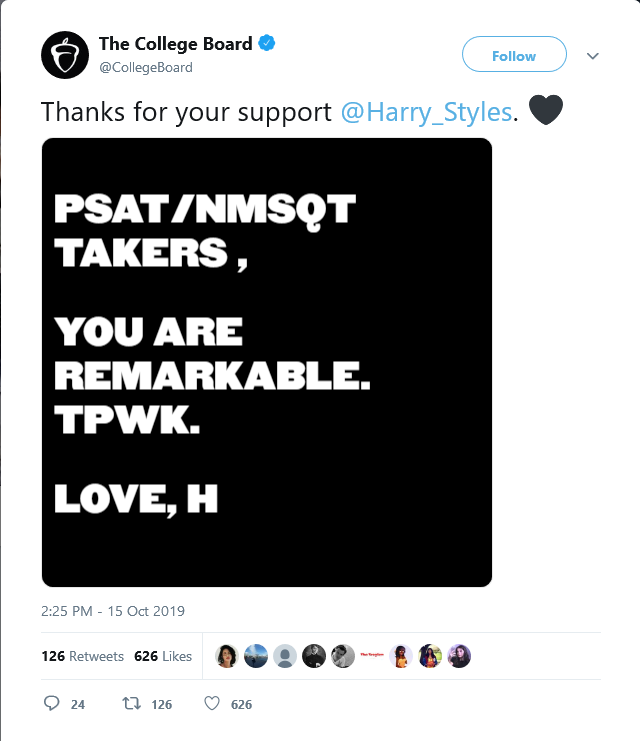
All over the US, high school juniors and sophomores are now taking the PSAT, which has been the norm for the past half-century. The contemporary trouble for test administrator the College Board is that the test’s ubiquity, the age of participants, and the high emotional stakes these days make the details of the exam guaranteed meme fodder—and, well, standardized tests are standardized. Posting memes about them could lead to teens getting hints about their contents. So the organization has taken to Twitter to try to salvage some semblance of their normal testing conditions. Teens are, as always, unimpressed.

The College Board has been on meme watch for years. The earliest signs of PSAT meme movements likely date back to 2014, when users on subreddit r/teenagers decided to “illegally discuss the PSAT,” and others took to Twitter and Tumblr to post their own reactions to test questions. The College Board has made it clear that it disapproves, sometimes posting stern messages warning test takers about the potential consequences and making frequent requests for students to delete tweets pertaining to the test.
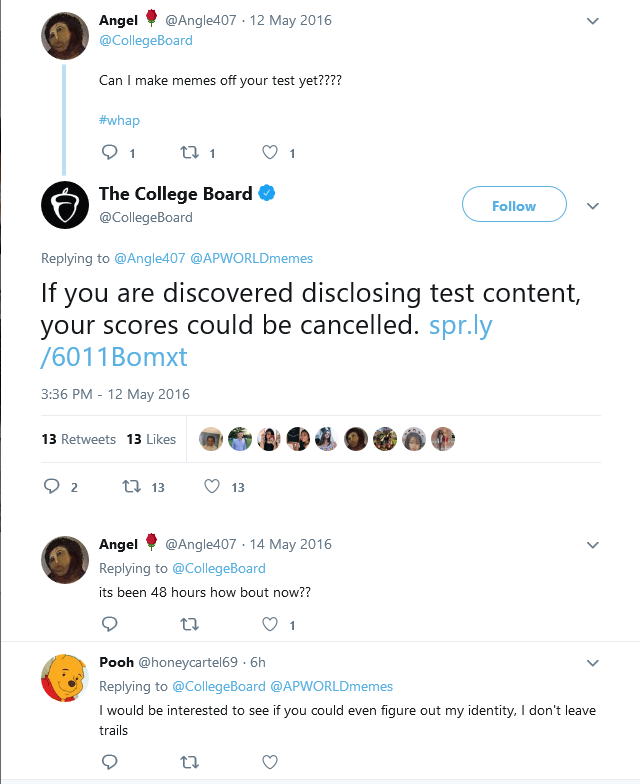
Mostly though, they’ve made a habit of annually offering up their own memes about not memeing to discourage memeing, which is a curious strategy and interesting window into autumns past.
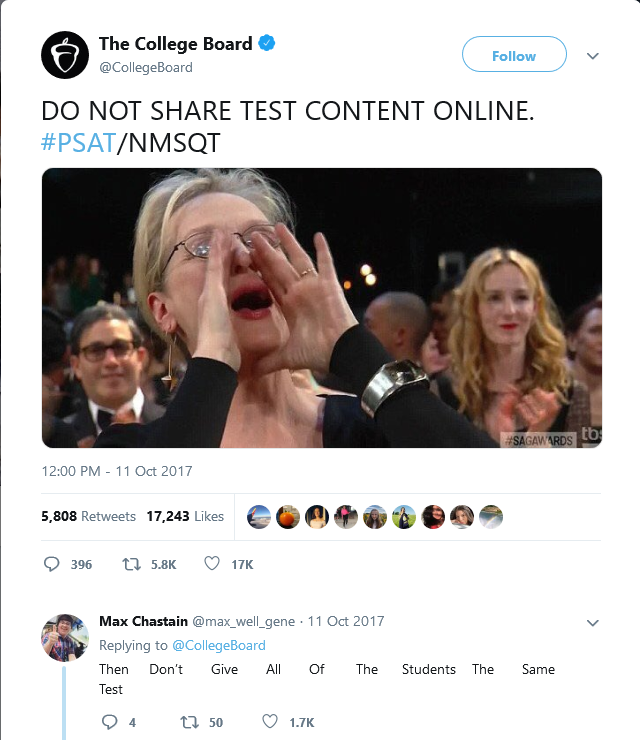
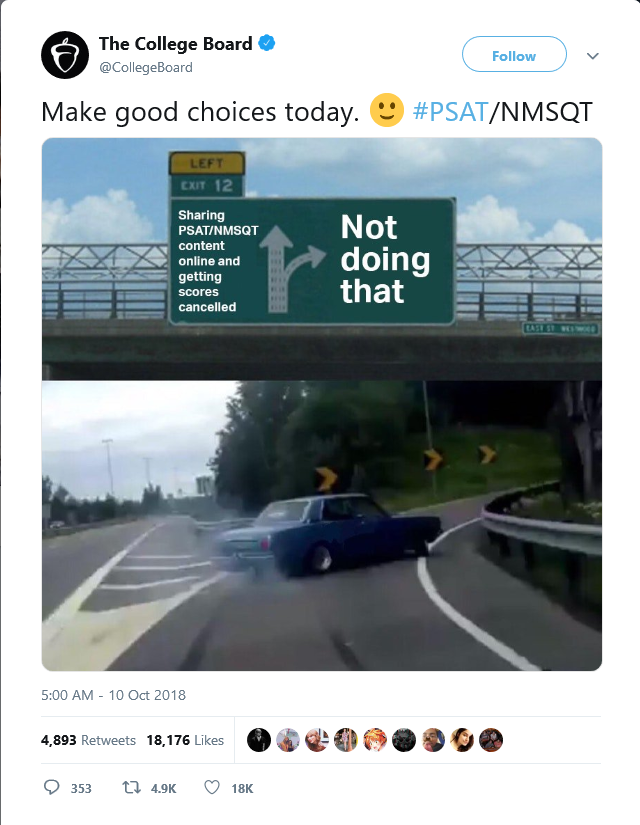
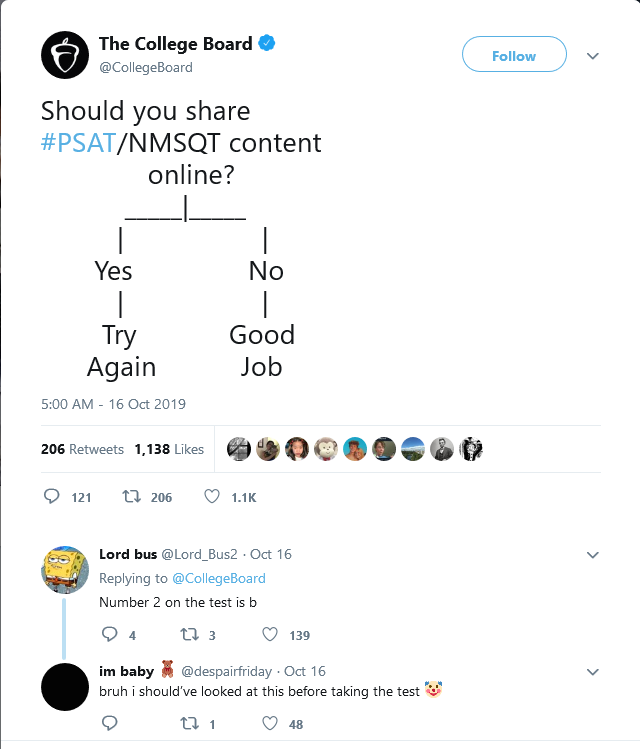
The College Board’s efforts are a bit of bizarro, “how do you do, fellow kids?” corporate memeing—not much better than the cringey clunkers people have come to expect from fast food companies’ Twitter accounts. The posts are no deterrent for test takers, who have flooded Twitter with #psatmemes this week. Truthfully, none of the students’ memes seems like it’s an especially helpful covert cheat sheet. If this year’s PSAT were a movie, I’d remain unspoiled—all I know is that mathematical constants and ambiverts came up, that somebody named Ruth read Nao’s diary, and that babies will get dirty if their mothers leave the house to vote. (That last one seems very weird out of context, College Board. What are you making the teens read?)
As someone not employed by the College Board, it’s hard to begrudge the teens their fun as long as they’re not explicitly handing out answers. Nationwide teenage levity at the expense of a dull standardized test (that potentially reinforces economic disparity) is quite a bit better than other teenage trends, like slurping Tide Pods or bullying their peers. It’s almost a little hopeful—an example of the internet bringing people together for casual fun in a time of stress, rather than creating new areas for public cruelty.
Besides, the youngsters show no signs of stopping. The savviest teens already know how to ensure their scores remain uncanceled: Just hide the memes from prying adult eyes by annually blocking @CollegeBoard on Twitter.
Article via Wired
Hilary Duff Admits She Struggles to Help Son With Homework: ‘I Stopped Going to Real School in Third Grade’
Hilary Duff is keeping it real.
The former Disney Channel star took to Instagram on Saturday to share a shout-out to her 7-year-old son, Luca, while revealing that she struggles helping him with his homework. Duff’s career as a child star with roles in Casper Meets Wendy and Lizzie McGuire prevented her from attending a brick-and-mortar school when she was around Luca’s age.
“This guy with his spirit and kindness?Homework is already no joke in 2nd grade. I stopped going to ‘real’ school in 3rd grade so I’m actually doomed,” Duff captioned a photo of herself with her son. “I am left scratching my head alll the time looking at his homework and I’m terrified for next year! Although Singapore math is the sh*t….also learned a lot about tick birds this week. #rhinosbegrateful.”
While Duff tries to help her son with his homework, he’s also learning more and more about his mom’s untraditional childhood. The Younger star recently revealed that she screened The Lizzie McGuire Movie for Luca and his little sister, 11-month-old Banks, and during an August interview with ET, she said Luca was a bit of a Lizzie fan.
“He’s seen some clips on YouTube, and I think he’s getting into it,” Duff said at D23, admitting “he’s still a little young” and very into Marvel these days.
“I don’t think I could even tell him that I’m here, if I took pictures with all of these Marvel stars,” she added. “But he thinks I’m pretty cool and I think he likes seeing me at an age closer to him.”
Duff will be reprising her role as Lizzie McGuire for Disney+. See more in the video below.
Article via Yahoo News


